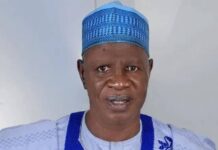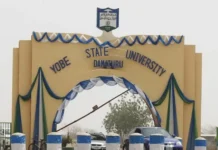The viral video of a recruitment exercise for the employment of Nigerian doctors to work in Saudi Arabia at the peak of Nigeria’s health crisis when resident doctors are on strike should jolt us to the reality of the total collapse of the health sector.
One of the potential employee-doctors told of how she met her former teacher at the medical school, also on queue for the recruitment to Saudi Arabia, and she graduated 10 years ago; which means that not only the young doctors are seeking greener pastures outside the shores of Nigeria, but even middle level and experienced medical personnel are running away from our comatose health system.
The latest industrial action embarked upon by the National Association of Resident Doctors (NARD) and Nigeria Medical Association (NMA)’s plan to join in solidarity will further complicate an already complicated case of leaving citizens in limbo by a government that has no answer or has refused blatantly to keep to its agreement with the medical workers.
The last 20 years or so have witnessed an unending back and forth between government and medical personnel and even university lectures, just because the government has failed to keep to an agreement it willingly entered. If the government fails to keep the faith, can it blame citizens for failing to obey the laws of the land?
Being the fourth time in two years that doctors would be on strike, the impact of the ongoing strike is so massive that all that the government could think about are knee-jerk reactions such as threats of ‘no work no pay,’ court orders seeking interim injunctions and the swift movement of men of State Security Service to Sheraton Hotel to stop the recruitment interview in question and disperse the doctors there.
These reactions unfortunately cannot stop the mass exodus of medical workers that has gripped this nation in the last few years but is more prevalent now, with the COVID-19 pandemic ravaging the world. Even in developed countries, where careers are well-remunerated generally, the medical profession stands out, and stories abound to support this.
A friend’s daughter who studied Mass Communication in Nigeria recently relocated to the UK to study Nursing. There is also the story of a UK citizen who has a master’s degree in international law and abandoned those degree certificates to study Nursing too. According to her, the COVID-19 pandemic has shown that the medical field is the most sustainable ever and will always be needed.
It is such multiple tragedies for the Nigerian people, and the Nigerian government, which resources were used to train these medical workers, and now allowing them to go to serve other countries because that same government cannot take care of their remuneration and welfare.
A look at the tuition fee for medical students in the UK will show how ours is almost free compared with theirs. Imagine paying between 40,000 to 58,000 pounds per year in medical school. But to now throw such investment in human capital as regards medical personnel is embarrassing. The non-payment of the COVID-19 allowance is particularly worrisome. As frontline workers in the efforts to manage the pandemic, the NARD lost 19 members. Did they have to go on strike to get their deceased members’ benefits paid?
Meanwhile, the month-long strike has left in its wake tales of sufferings and sorrows. Somewhere in Mararaba, parents of a set of pre-term twins had to move their under-mature babies to a private hospital in Asokoro where they were asked to deposit 1 million Naira to be able to access the hospital’s incubator and other medicare. There is yet another story of staff of a private media house in Abuja who kept her pre-term baby at home for lack of funds to take him to a private hospital only for the baby to die a few days after.
The face-off between NARD and the government will leave its scars on innocent people who are unable to save their loved ones. It is convenient to blame the medical personnel for the strike and loss of lives, but the greater responsibility for the welfare of the citizens has been clearly stated in the constitution. No doctor can be at his maximum best if he cannot pay his bills and put food on the table for his family. No matter how patriotic one wants to be, by remaining in Nigeria despite all odds, your existential reality and self-survival can push you into the mass exodus train from Nigeria to the certainty of good pay and allowances.
I don’t know what the Nigerian government hoped to achieve by unleashing the security operatives to disperse the would-be escapee-doctors massed at Sheraton hotel for the recruitment interview after it failed woefully to manage the strike. This amount to looking outwards for a problem that is within, the same way government blames those who complain about their shoddiness rather than blame their incapacity.
This raises another question of the way Nigeria’s resources are utilised. Nigeria is an oil-producing country just like Saudi Arabia. However, while our resources are frittered away or stolen through many channels, Saudis have used theirs to fix their economy, build infrastructure and world-class hospitals (with good pay to booth) conducive and attractive enough for Nigerian doctors.
Besides, the mismanagement of the economy, our appetite for imported goods, a mono-economy dependence, insecurity and the free-fall of the Naira have combined to ruin our lives and economy. With one Saudi Riyal equaling N109 Nigerian Naira, and one dollar equaling 411 Nigerian Naira, only a radical turnaround of our fortunes as a nation can stop more people fleeing the country for better and higher pay.
As a people, there is not much we can do, but the government can stem the tide of brain drain generally and the mass exodus of Nigerian doctors to other countries by fixing our intractable security problems. Above all government should stop politicizing medical issues, because health is one of those things that bind humanity, rich or poor. Much of the money we spend on big wedding ceremonies of VIP’s children and to build mansions at every nook and cranny can be diverted to health. It only depends on getting our priorities right and the value we place on human lives as against material acquisitions.
Zainab Suleiman Okino can be reached at zainabsule@yahoo.com or www.zainabokino.blogspot.com.
Follow the Neptune Prime channel on WhatsApp:
Do you have breaking news, interview request, opinion, suggestion, or want your event covered? Email us at neptuneprime2233@gmail.com





